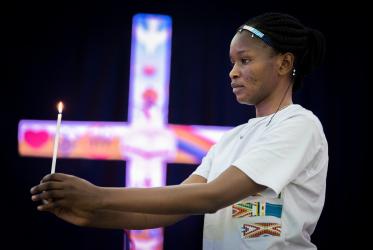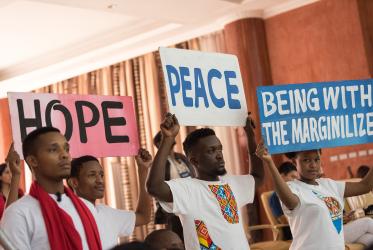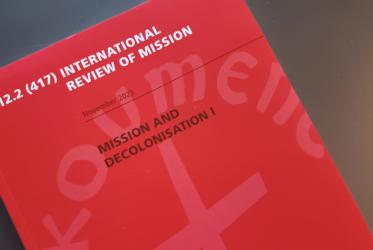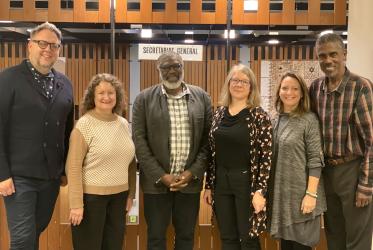In a recent interview for Christian Conference of Asia (CCA) News, four ecumenists from regional and international conciliar fellowships from Asia, North America and the World Council of Churches (WCC), responded to questions about the role and challenges of ecumenical councils and the importance of conciliar unity in a changing ecumenical and ecclesial context.
Rev. Dr Daniel Buda, coordinator of the Church and Ecumenical Relations programme of the WCC, pointed out the importance of not bringing institutionalized ecumenism to the grassroots level when efficient, sincere and not artificial ecumenism already exists there. “The real challenge then is how to use the gifts of these grassroots level ecumenism to strengthen institutionalized ecumenism at the global level”, he said.
By Gianina Fay Cortez Vecino & Navya Dinah Saji
“With their particular ministries, traditions and cultural identities, the churches are called to build up communion, to serve the body of Christ through a fellowship of churches. The ecumenical councils and fellowships demonstrate signs of the visible expressions of unity; they are privileged instruments aimed at facilitating the coming together of churches in a common platform despite their differences. In common prayer, sharing of concerns and working together in a spirit of mutual recognition, the churches participate in God’s mission in the household of God, for which conciliar unity has to be strengthened in each context, place and situation”, opined Dr. Mathews George Chunakara, the General Secretary of CCA.
“The primary goal of ecumenical councils is the healing of broken koinonia and strengthening unity. Modern ecumenical councils have proved that what is common in faith and hope is greater than the differences that separate the churches. The growing interests and willingness for togetherness and joint actions by churches at the local, national, regional and global levels have been the hallmarks of conciliar unity, and strength of ecumenical fellowships. However, today the goal of conciliar unity is often hindered due to various reasons, mostly due to non-theological factors or a lack of vision, and a sense of direction as well as lack of commitment to unity”, said Dr. Mathews George who heads the oldest and the first regional ecumenical council which was founded in 1957.
A seasoned ecumenist who has also worked in the WCC Secretariat in Geneva for about fifteen years, Dr. Mathews George explained out of his experiences about the values and ethos of conciliar unity and added, “the modern ecumenical movement, especially through the work of the WCC as well as the national and regional ecumenical bodies, has created an atmosphere of mutual respect, openness and rapprochement among the churches which have been deeply divided by history, theology, culture and geography”.
He said, “The growth of the ecumenical spirit over the years helped the churches and councils to move away from isolation to collaboration, conflict to cooperation, and suspicion to mutual recognition. When the churches came together to pray together and to act together at the local, national, regional and global levels through councils and fellowships, those churches demonstrated their commitment to initiate institutional expressions of collaboration and conciliar unity”.
“However, the reality now is that the vision for conciliar unity is blurred, and the ecumenical councils in several contexts lack a sense of direction. There is an urgent need to address this concern and all stakeholders in the ecumenical movement should refocus on the original vision of conciliar unity, in order to convey the message of ecumenism in a more relevant way”, Dr. Mathews George proposed.
While responding to a question on the need for strengthening ecumenism at the grassroots and the role of WCC in strengthening conciliar unity, Mr. Jim Winkler, General Secretary of the National Council of Churches in the USA said that although the variety of WCC programmes certainly helped ecumenism, it was really important for such programmes to facilitate strengthening of conciliar unity in the regions. He added that the responsibilities of the other actors in the regions or countries were better equipped to implement those programmes at the grassroots level. There was no way that a world body could bring everything down without any collaboration with regional and national ecumenical bodies and member churches; there should be a complementary relationship.
Rev. Dr. Daniel Buda, who coordinates the Church and Ecumenical Relations programme of the WCC, was of the opinion that ecumenism already existed at the grassroots level, perhaps just not very well connected to what was commonly called the “high level”.
“It is a question as to what is the “high” and “low” level in ecumenism. There is definitely ecumenism at the grassroots level which is initiated by the people who believe, confess and witness Jesus Christ. The challenge then is not to bring institutionalized ecumenism to the grassroots level when ecumenism already exists there, which is efficient, sincere and not artificial. The real challenge then is how to use the gifts of these grassroots level ecumenism to strengthen institutionalized ecumenism at the global level”, said Dr. Buda, a Romanian Orthodox priest.
Mr. Winkler expressed a concern and said, “The most important question though is how are we raising and training a new generation of ecumenists who will continue the tasks through ecumenical councils? The biggest challenge the ecumenical movement faces is the leveraging and lack of resources which stops many from reaching out”.
With regard to the challenges in addressing the issues, Mr. Winkler said, “With the shrinking of the members of the traditional churches in the USA, churches are turning inward; at a time when they should be cooperating more and focusing more on raising a new generation, they are focusing more on restoring and regaining their membership growth.”
“It takes not only faith but also courage and willingness to do things differently. There is a need to create a level of consciousness and even a critical mass in leadership to do so. Ecumenical councils in this context can take a role through member churches, but so far there have not been many evidences at least in the US contexts”, he added.
Mr. Winkler felt that “it is important that the WCC and the REOs have a common understanding of how to work cooperatively and do so transparently in order to avoid duplication and miscommunication among them while they initiate and organize programmes in the regions.”
Answering a question on the role of WCC in strengthening ecumenism in collaboration with the REOs, especially after 70 years of rich experiences, Dr. Ani Ghazaryam Drissi said “WCC is a fellowship that brings together over 350 churches and denominations. The WCC is still relevant because the churches in this fellowship are active in their communities, nations and regions.”
“As issues are worsening day by day, we can see that theological, ethical and religious questions are becoming more visible now. The member churches must be mobilized in order to address the issues, for which ecumenical councils, especially the WCC and the REOs together help churches to move forward and face the challenges”, said Dr. Drissi, a programme executive for the Faith and Order Commission of WCC.
She added, “Regional Ecumenical Organisations are an integral part of the WCC and collaborations with the REOs bring more opportunities and possibilities to relate to the rest of the world. The WCC cannot work without the REOs. It is a mutual relationship and we need each other in order to work together at all levels”.
Regarding the issues in the ecumenical field that need to be addressed based on his experiences of working with WCC’s Church and Ecumenical Relations office for ten years, Rev. Dr. Buda said, “There are many things that need to be addressed to strengthen conciliar unity. WCC has to listen to the concerns of its member churches; there is always a gap, big or small, between what the member churches would like the body to do or expect to do and what is actually being done”.
According to him, “the ecclesial landscape is changing rapidly and sometimes, the ecumenical organisations are the last ones to adapt to this reality”.
Rev. Dr. Daniel Buda mentioned that it was the task of WCC staff to build better relationships between ecumenical organisations and member churches and also between the member churches.
In response to a question on whether conciliar fellowships were effective instruments to ensure unity as a practical reality or if it remained only an idea so far, both WCC staff members agreed that it had to be a practical reality.
“WCC, REOs, NCCs and other ecumenical organisations play complementary roles and we need to understand each body’s role. There is no competition at all and it is a fact that we need each other”, agreed Dr. Buda.
The WCC, all four of them agreed, has a convening role in the global ecumenical movement. REOs are integral part of the WCC and collaborations with the REOs bring more opportunities and possibilities for WCC to relate to the rest of the world and demonstrate its leadership.
“The WCC cannot work effectively without collaborating with the REOs in regions. However, it is important for the global ecumenical body to be coherent in its convening, facilitating and implementing roles”, they opined.







